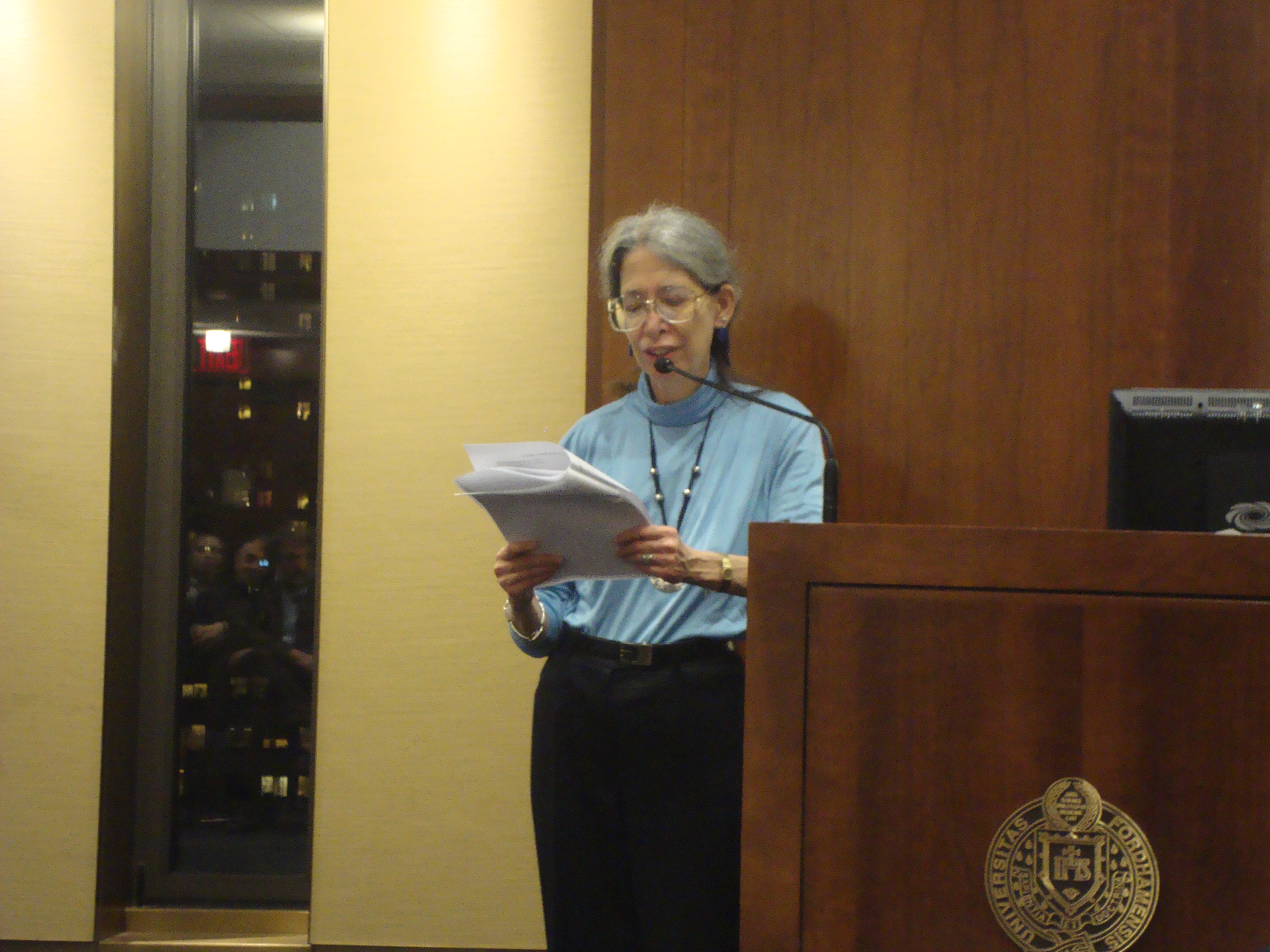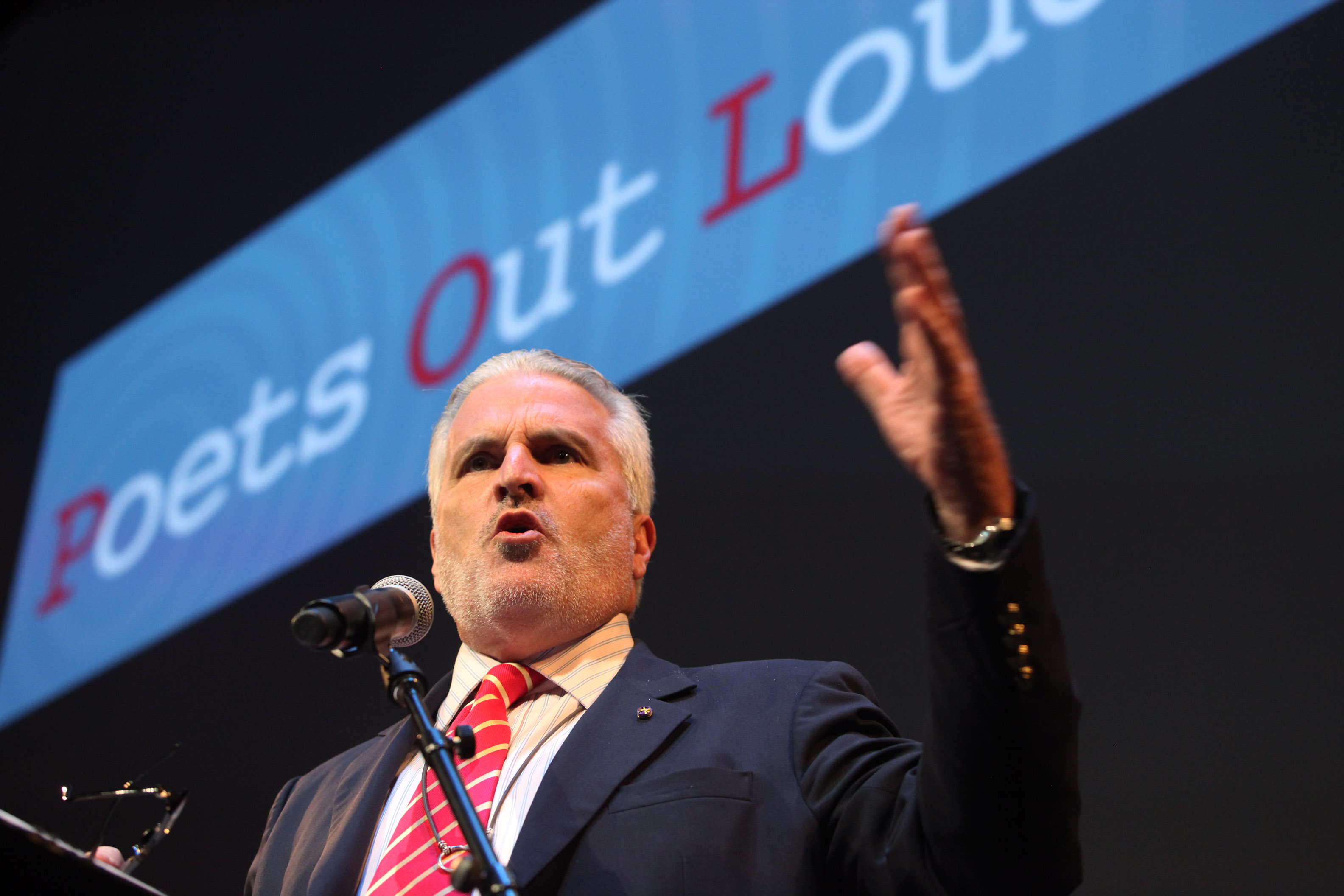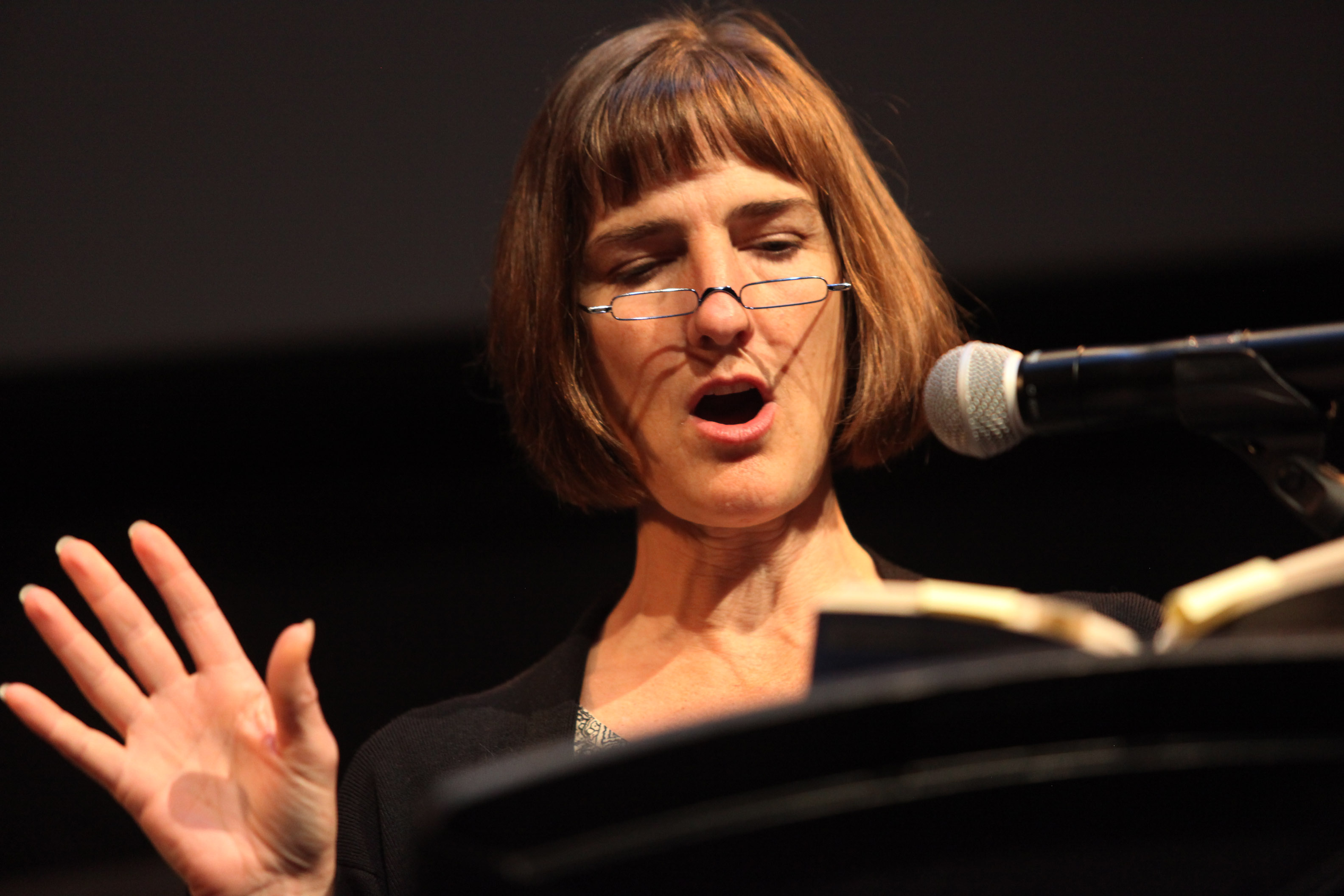Heather Dubrow, director of the Poets Out Loud reading series, holds the John D. Boyd SJ, Chair in the Poetic Imagination at Fordham University. A critic of sixteenth- and seventeenth-century English literature, she has published six scholarly books, a coedited collection of essays, and an edition of As You Like It (as well as articles on pedagogy and educational policy). Wearing her other hat as poet, she is the author of a collection titled Forms and Hollows (Cherry Grove Collections), two chapbooks, and a play produced by a community theatre. The journals where her poetry has appeared include Prairie Schooner, the Southern Review, the Southwest Review, Virginia Quarterly Review, and the Yale Review. Two of her poems have been set to music and performed, and one was featured on the Poetry Daily site.)
 After I’d taught for many years at Carleton College and the University of Wisconsin (and more briefly elsewhere), Fordham University offered me the John D. Boyd SJ, Chair in the Poetic Imagination—an appointment that I might well have accepted for that title alone. When I arrived, Elisabeth Frost was heroically directing both the Poets Out Loud readings and the contest whose winner, the POL Prize book, is published by Fordham University Press. But about a year later Beth decided to focus on the latter portfolio, her work as editor of the Poets Out Loud book series (she shortly afterwards expanded the program to include publishing a second book each year)—and I happily inherited the program of poetry readings.
After I’d taught for many years at Carleton College and the University of Wisconsin (and more briefly elsewhere), Fordham University offered me the John D. Boyd SJ, Chair in the Poetic Imagination—an appointment that I might well have accepted for that title alone. When I arrived, Elisabeth Frost was heroically directing both the Poets Out Loud readings and the contest whose winner, the POL Prize book, is published by Fordham University Press. But about a year later Beth decided to focus on the latter portfolio, her work as editor of the Poets Out Loud book series (she shortly afterwards expanded the program to include publishing a second book each year)—and I happily inherited the program of poetry readings.
If anyone else is in line for such an inheritance, hold out for a series like POL: I am fortunate to direct a program that benefits from having been alive and well for over two decades (we celebrated its twentieth anniversary with the gala event at Lincoln Center’s Rubinstein Atrium featuring J. D. McClatchy and Julie Sheehan and from all the work of Elisabeth Frost and earlier directors. And we benefit from being in New York, with its splendid supply of both distinguished and promising poets.
Of course, our metropolitan location has its downsides, too. Hotel prices and other expenses are steep enough that we can almost never invite out-of-town writers. Fortunately, the Jesuit commitment to poetry, exemplified by and perhaps itself inherited from Gerard Manley Hopkins, as well as the much appreciated support of Poets & Writers, keeps us afloat, though on a shoestring (if shoestrings, like those airplane cushions, can function as flotation devices). Another challenge of being in New York is that competition for audiences is intense here; in contrast, at, say, Carleton, the visiting writer was usually the only game in town. But we hold all the readings at Fordham’s campus in Manhattan, near Lincoln Center, which is readily accessible to people throughout the city, and we regularly attract audiences of about ninety to a hundred people, with nearly twice that for a few events.
I’ve happily continued many longstanding POL policies. We’re deeply and enthusiastically committed to diversity in the poetic styles and ethnicities of the readers and similarly committed to representing both established and emerging writers. In other words, POL refuses to be drafted into the poetry wars. Admission remains free. And our audience is also diverse, encompassing everyone from high school and university students from Fordham and around the city to very distinguished poets to members of the general public.
 Taking over a series that was already going strong opened up possibilities for additional initiatives. Looking inwards to the Fordham community, we now encourage entering students to become familiar with POL from the get-go by connecting our September reading to the themes of First-Year Orientation. Looking outwards, we have an outreach to high school students from underserved communities; our current partners are Cristo Rey New York High School, the High School for Business, Enterprise, and Technology, and the organization Girls Write Now. Students from those groups participate in prereading workshops on the poets appearing that night—which those poets visit—before going to the reading itself. Like other members of the audience, they have the opportunity to enter drawings and win a free inscribed book by one of the evening’s writers. In the final event of the year, some of these high school participants read their own work together with a distinguished writer in what we call a poetry sandwich (in past years Edward Hirsch, Marie Howe, and Anne Waldman appeared in these sessions, while this year we look forward to Elizabeth Alexander’s participation); in 2014 we’ll be publishing poems by all the students in the workshops, not just those who read that night, on our site. And last year POL took its show on the road—or rather on the subway—by setting up another outreach, this time to senior citizens, by reading in a few residences.
Taking over a series that was already going strong opened up possibilities for additional initiatives. Looking inwards to the Fordham community, we now encourage entering students to become familiar with POL from the get-go by connecting our September reading to the themes of First-Year Orientation. Looking outwards, we have an outreach to high school students from underserved communities; our current partners are Cristo Rey New York High School, the High School for Business, Enterprise, and Technology, and the organization Girls Write Now. Students from those groups participate in prereading workshops on the poets appearing that night—which those poets visit—before going to the reading itself. Like other members of the audience, they have the opportunity to enter drawings and win a free inscribed book by one of the evening’s writers. In the final event of the year, some of these high school participants read their own work together with a distinguished writer in what we call a poetry sandwich (in past years Edward Hirsch, Marie Howe, and Anne Waldman appeared in these sessions, while this year we look forward to Elizabeth Alexander’s participation); in 2014 we’ll be publishing poems by all the students in the workshops, not just those who read that night, on our site. And last year POL took its show on the road—or rather on the subway—by setting up another outreach, this time to senior citizens, by reading in a few residences.
Poets Out Loud has also been very pleased to build bridges to other poetry organizations. We’ve been cosponsoring events with the Poetry Society of America for two years now—this year’s readers were Frank Bidart and Jonathan Galassi. In 2013 Fordham initiated and co-organized a series of readings and discussions on the subject of Donne and Contemporary Poetry, with participants including the Barnard Women Poets series, the New York Public Library, and the John Donne Society; future events in the series are planned at the interdisciplinary organization Helix and Fordham itself.
Well, actually, we had a splendid program in that Donne and Contemporary Poetry series all set up in February at Fordham (Molly Peacock reading, Nigel Smith performing his settings of Donne poems), only to be snowed out. John Donne, Un-done, as he apparently wrote himself. But I assured his agent that the event is being rescheduled in the fall. (Visit www.fordham.edu/pol for a forthcoming announcement).
 The touchstones for poetry that Emily Dickinson famously identified also aptly describe directing a poetry reading series. “If...it makes my whole body so cold no fire can ever warm me”—yes, that describes running a poetry series when an elaborately planned event like that one is cancelled or when one discovers the day before a reading that another group is widely announcing that it has booked the room assigned to us. On the other hand, Dickinson also declares of poetry, “I feel physically as if the top of my head were taken off”—and the top of my head has been delightfully and delightedly blown off by the readings themselves and by the audience’s responses. Witness comments such as “Fantastic series. Has reignited my love of poetry” and “Much more entertaining than I had ever expected to find poetry” and "Poets Out Loud reminds me how and why I fell in love with poetry and why it will always be a part of me.”
The touchstones for poetry that Emily Dickinson famously identified also aptly describe directing a poetry reading series. “If...it makes my whole body so cold no fire can ever warm me”—yes, that describes running a poetry series when an elaborately planned event like that one is cancelled or when one discovers the day before a reading that another group is widely announcing that it has booked the room assigned to us. On the other hand, Dickinson also declares of poetry, “I feel physically as if the top of my head were taken off”—and the top of my head has been delightfully and delightedly blown off by the readings themselves and by the audience’s responses. Witness comments such as “Fantastic series. Has reignited my love of poetry” and “Much more entertaining than I had ever expected to find poetry” and "Poets Out Loud reminds me how and why I fell in love with poetry and why it will always be a part of me.”
Top Photo: Heather Dubrow. Photo Credit: Katie Lockhart. Middle Photo: J. M. McClatchy. Photo Credit: Michael Dames. Bottom Photo: Julie Sheehan. Photo Credit: Michael Dames.
Support for Readings & Workshops in New York City is provided, in part, by public funds from the New York State Council on the Arts, and the NewYork City Department of Cultural Affairs, with additional support from the Louis & Anne Abrons Foundation, the Axe-Houghton Foundation, the A.K. Starr Charitable Trust, and the Friends of Poets & Writers.






